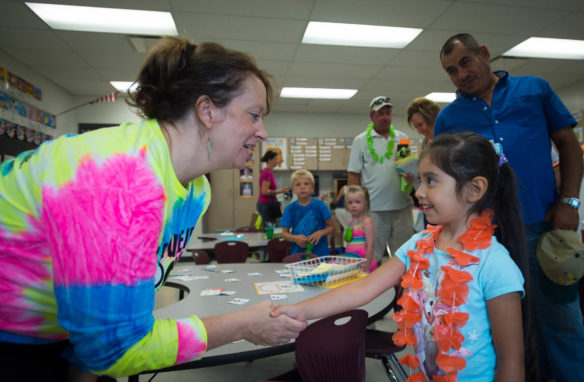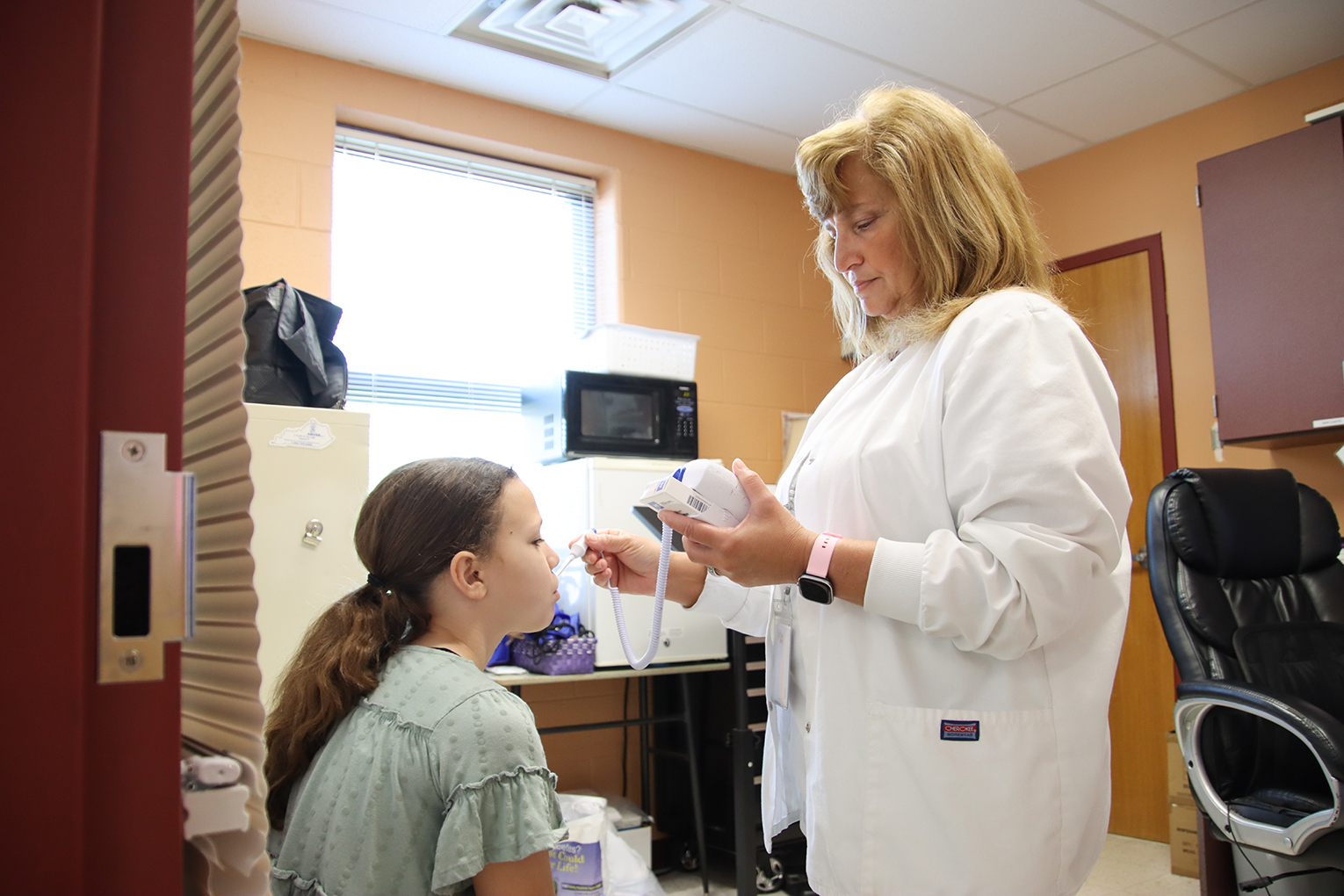
Ahtziri Magana, right, meets her kindergarten teacher, Lisa Fischer, as her father looks on during the Meet the Teacher night at Longbranch Elementary (Boone County). The school is starting new Parent Leadership Teams this year.
Photo by Bobby Ellis, August 9, 2016
By Brenna R. Kelly
Brenna.kelly@education.ky.gov
Longbranch Elementary Principal Erika Bowles often tells the 1,600 parents of her students that they are welcome to help out at the Boone County school in any way they choose. Not everyone takes her up on the offer.
“We have a lot of involved parents, but I think we could have a lot more than we actually do have,” said Bowles, who has been principal since the school opened seven years ago.
Bowles thought her open-ended invitation was a way to be inclusive, “but all I was doing was probably pushing parents off even more because, they were thinking, ‘I don’t know what you want,’” she said.
So this year, Bowles decided to list nearly 40 volunteer opportunities for parents or family members. The list includes jobs such as reading with students, grant writing, landscaping or organizing a school tailgate party for the high school football game.
“I have asked every parent to do one thing, instead of having 10 parents doing everything,” she said.
The idea came about as the result of Boone County Schools’ renewed focus on family engagement and the school’s adoption of the Leader in Me philosophy, Bowles said.

Kindergarten teacher Lori Maddux hugs her student Elissa Brown during the Meet the Teacher Night at Longbranch Elementary (Boone County).
Photo by Bobby Ellis, August 9, 2016
Bowles’ strategy is just one example of how Boone County schools are reaching out to families in new ways after the district decided to place a greater emphasis on family engagement, said Jim Detwiler, assistant superintendent for learning support services.
“The research shows that engaged parents lead to engaged students which leads to student achievement,” he said. “So at the district level we want to set the tone of that mindset, and then any way we can, provide resources to schools to make that happen and model it for them.”
The district kicked off the initiative in 2014 when each of the district’s 25 schools formed a team of teachers, parents and administrators. Those teams attended a two-day workshop with Joe Mazza, an expert on family engagement and leadership innovation manager at the University of Pennsylvania’s Graduate School of Education.
The groups used the book, “Beyond the Bake Sale: The Essential Guide to Family–School Partnerships”, to analyze how well their schools welcome families and to come up with ways to create family-school partnerships.
After the sessions, the district and many of the schools created Family and Community Engagement (FACE) teams and continued to work with Mazza to develop individual school plans to increase family engagement.
Mazza, who has worked with schools and districts across the country, believes that more educators are starting recognizing the importance of involving families.
But opening the school doors to families can be uncomfortable for some educators, he said.
“There’s way too much of a school silo and a home silo and it’s partly because relationships are hard, they are effort,” he said. “Schools also make it so formal because to tell you the truth, not everybody loves this part of the job.”
Most teachers didn’t learn how to interact with families in college or during student teaching, he said. For example, when he was studying to become a teacher, Mazza watched two parent-teacher conferences.
“That was pretty much the substance of my family engagement training as a preservice teacher and that’s not enough,” he said.
Educators should be talking to parents wherever they are, including on social media and email, not just for a few minutes at a parent-teacher conference.
“Why are we still in doing parent teacher conferences only on the 17th, in room 208, from 4 to 4:15 p.m.?” he said. “Why can’t we do that on FaceTime or why can’t we just live like we live? Why does school have to be this separate thing?”
The beginning of the school year is a great time to connect with students’ families, Mazza said, because it can set the tone for the rest of the year.
“If you miss that window and somebody feels like they aren’t involved, they will just stay out,” he said.
Family engagement events should not only serve as a way to connect families to the school, but also to each other, and they should be part of a strategy to improve student achievement.
“The things that don’t connect together, that don’t have anything to do with teaching and learning, they should not be part of your family and community engagement strategy for the year,” he said.
Mazza is also the digital strategist for the National Association for Family, School and Community Engagement and an organizer of ParentCamp, an unconference based on the EdCamp model.
“It’s focused on building home-school partnerships by bringing those people together face to face,” he said. “Not to talk about my kid or your kid, but how adults can come together to work for kids.”
There have been 45 events in the last three years with the next one being held in conjunction with the U.S. Department of Education on Oct. 14 in Washington, D.C.
Boone County parent Julie Pile met Mazza through his work with the county and is now helping organize ParentCamps. Pile first became involved in the PTA at Stephen’s Elementary, then in 2012 she attended the Governor’s Commonwealth Institute for Parent Leadership (GCIPL).
“My philosophy is parents can,” Pile said. “Parents can be involved. Parent involvement takes all kinds of shapes and sizes, just helping with homework is being involved in your child’s education.”
Many parents think if they can’t volunteer during the day, they can’t be involved with their child’s school, she said.
“Everybody has something they can give,” Pile said. “Every parent can do this, but a lot of times they don’t know how.”
Pile, who serves on the district FACE Team, credited Superintendent Randy Poe with setting a tone of openness and valuing parental input.
“That just pushes down into the schools,” she said. “All the studies say the more involved parents are, the more successful kids are and Boone County has really embraced that.”
Recently the district made family and community engagement part of its five-year strategic plan, Detwiler said. The plans urges teachers to “empower parents by including parent engagement strategies when planning for instruction, with the goal of providing knowledge about learning standards and ways for parents to participate in their child’s mastery of these standards.”
The district also has held professional learning for principals on including parent engagement it in their school improvement plans using the Missing Piece of the Proficiency Puzzle, a Kentucky Department of Education report that provides recommendations for involving families and communities in education and a rubric to assess school efforts.
“We want to make sure that schools are including parents and stakeholders and not treating it as a compliance thing, just checking boxes,” Detwiler said. “It’s a beautiful tool the state has given us; let’s use it for what’s intended and see where it takes us.”
The district has also worked with a social media expert to make sure they are having conversations with parents and the community, not just sending out information.
“All of this is kind of experimental,” he said. “This year we’re hoping to beef up our parent engagement up a bit and keep moving forward.”
That’s just what Bowles is doing at Longbranch.
Bowles worked with the PTA, the FACE Team and GCIPL parents to come up with the new Parent Leadership Action Teams.
The teams will allow every parent to find something he or she can do, Bowles said. There’s even an option for parents who would rather work alone. Parents can choose to be a leader of a team, or choose to be part of a team.
“Our volunteer opportunities are not just helping in a classroom. But we have done a very poor job in our infancy as a school to advertise what those other things would be,” she said. “We’re fixing that now.”
MORE INFO …
Erika Bowles Erika.Bowles@boone.kyschools.us
Jim Detwiler James.Detwiler@boone.kyschools.us




As I read this article, I kept wondering if the school system is not overlooking other groups of county citizens whose help could be invaluable to students and teachers somewhere in the education process. No group of people was mentioned in this article except current parents of students.
Many grandparents, people whose children have all graduated, or those with no children sometimes have more free time to assist in some way than working parents. Perhaps the county should consider these groups of people during this push to “open the schoolhouse doors.”